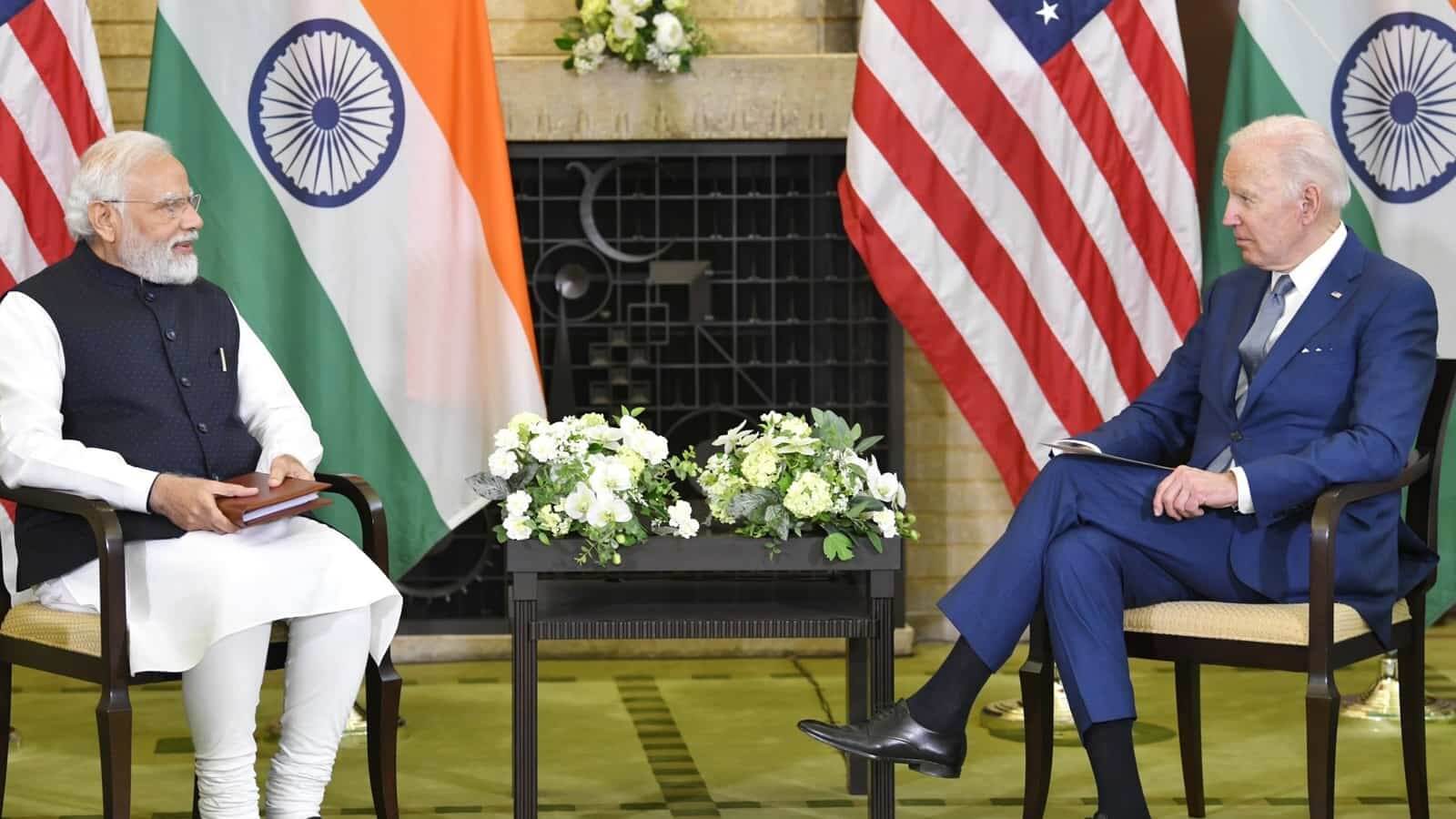Indian Prime Minister (PM) Narendra Modi met with United States (US) President Joe Biden on Tuesday on the sidelines of the Quad summit in Tokyo and discussed expanding their partnership in defence, health, and climate action.
The pair celebrated flourishing bilateral relations, which they said are rooted in “democracy, freedom, tolerance, and equal opportunity for all citizens.” They also reviewed the outcomes of the India-US 2+2 Ministerial Dialogue held in Washington last month.
Here is a brief summary of the details of their meeting:
Indo-Pacific
President Biden appreciated India’s decision to join the Indo-Pacific Economic Framework (IPEF), which aims to achieve a connected, resilient, clean, and fair global economy. It was earlier signed by 13 other initial partners, including Australia, Japan, Republic of Korea, and Vietnam. In this regard, the US president said India’s participation “will help ensure an open, connected, and prosperous Indo-Pacific.”
The pair also discussed the importance of “maritime domain awareness” in protecting economic security and preventing humanitarian crises. Keeping this in mind, Biden said the IPEC and the Indo-Pacific Maritime Domain Awareness program would help unite India and US’ desire for a “more open and more prosperous, connected, and secure world.”
On a similar note, PM Modi said that the Quad and the IPEF indicated the US and India’s common view on the Indo-Pacific. To this end, he noted, “I’m absolutely sure that the India-U.S. friendship will continue to be a force for good, for global peace and stability, for the sustainability of the planet, and for human development.”
Had a productive meeting with @POTUS @JoeBiden. Today’s discussions were wide-ranging and covered multiple aspects of India-USA ties including trade, investment, defence as well as people-to-people linkages. pic.twitter.com/kUcylf6xXp
— Narendra Modi (@narendramodi) May 24, 2022
Defence
Biden and Modi expressed their desire to expand their existing partnership in new domains of defence cooperation, such as space security, cybercrimes, and artificial intelligence.
The pair announced that India will be joining the Combined Military Forces-Bahrain as an associate member. The alliance is a 34-member naval coalition that aims to promote cross-border counterterrorism cooperation in the Red Sea and the Suez Canal. Its key focus areas are countering narcotics, smuggling, and piracy. Furthermore, it encourages regional cooperation to promote “a safe maritime environment free from illicit non-state actors.” The alliance can also intervene in environment and humanitarian issues.
Ukraine Crisis
A readout by the White House said that President Biden condemned Russia for launching the “unjustifiable war against Ukraine.” It highlighted that the two leaders expressed their mutual commitment to provide humanitarian aid. They also lamented the war’s disastrous impact on energy and food prices, as well as peace and security.
However, the Indian release did not specifically mention the Ukraine crisis and merely said that the pair “exchanged views on regional issues of mutual concern.”
"India-US Strategic in true sense a partnership of trust", PM Modi tells President Biden. Adds, "our common interest and shared values have strengthened" calling "partnership unique" https://t.co/8YbW3hQQvM
— Sidhant Sibal (@sidhant) May 24, 2022
Economic Ties
The two leaders celebrated the conclusion of the Investment Incentive Agreement, which will pave way for the US International Development Finance Corporation (DFC) to invest in India in areas such as renewable energy, agriculture, health, and small and medium-sized enterprises financing.
The agreement was signed by Indian Foreign Secretary Vinay Kwatra and the DFC’s Chief Executive Officer and legally mandates the corporation’s continued investment in India. The DFC has thus far provided $5.8 billion to India and is considering proposals for another $4 billion in investments.
PM Modi, meanwhile, invited American businesses to invest in India and expand its manufacturing abilities in pursuance of its Make in India and Atmanirbhar Bharat programs.
The question of India-US defence partnership did come up in discussion between PM Modi & President Biden and the focus of the discussion was on defence manufacturing by the American companies in India under the framework of 'Make in India' and 'Aatmanirbhar Bharat': Foreign Secy pic.twitter.com/r9KASCjJqv
— ANI (@ANI) May 24, 2022
Health
Biden and Modi also discussed the decision to extend the Indo-US Vaccine Action Program until 2027 and continue combined biomedical research programs. They celebrated the initiative’s success stories in “the discovery, development, and manufacture of India’s first indigenous and low-cost vaccines to address rotavirus and COVID-19.” In this regard, they discussed the need to expand cooperation “to combat antimicrobial resistance, as well as non-communicable diseases such as diabetes.”
The pair further discussed the need to bolster their partnership in global health and pandemic preparedness.
PM @narendramodi holds talks with @POTUS @JoeBiden in Tokyo.
— PMO India (@PMOIndia) May 24, 2022
Both leaders shared their views on a wide range of issues and discussed ways to deepen the India-USA friendship. pic.twitter.com/a1xSmf5ieM
Technology
Modi and Biden also celebrated the launch of the US-India Initiative on Critical and Emerging Technologies (iCET), which was set up by their National Security Councils with the aim of expanding cooperation in critical and emerging technologies.
Furthermore, they announced the US’ plan to join six of India’s Technology Innovation Hubs and extend support to 25 joint research projects in 2022 on issues such as artificial intelligence, data science, agriculture, health, and climate. Similarly, they declared that the US National Science Foundation and the Indian Department of Science and Technology will expand cooperation through the US-India iCET Technologies.
Climate Action
The duo discussed their “shared belief” on the urgency for climate action through cooperation in renewable energy and decarbonisation. They stressed on the need to expand the US-India Climate and Clean Energy Agenda 2030 Partnership to “accelerate India’s just energy transition.”

